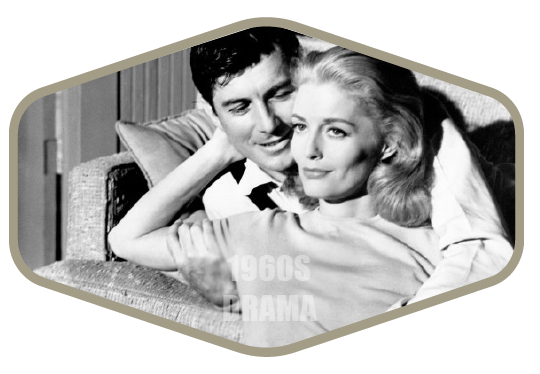The 1960s was a turbulent decade of assassinations, Civil Rights marches, Anti-Vietnam War protests, Woodstock and the Summer of Love. From Hollywood's perspective, it was an era of money woes with a wanning moviegoer audience due largely to the meteoric rise in television viewership.
In the spirit of "if you can't beat 'em - join 'em", Hollywood began embracing the upstart television medium with an arrangement with NBC to air How to Marry a Millionaire (1953) on the premier of Saturday Night at the Movies in 1961. This soon began a trend of airing marquee Hollywood films on this smaller but surging medium. Though by 1964, a shortage of Hollywood films led to the advent of made-for-TV movies.
A more relaxed film rating system (the Hays Code, which ended in 1968) dared filmmakers to push boundaries of acceptable sexual, violence, drug use and other mature-themed content. This was evident with films such as: The Detective (1968), Psycho (1960), Lolita (1962), Bonnie And Clyde (1967), Rosemary's Baby (1968), In Cold Blood (1967), and The Graduate (1967) among others.
Within the overarching genre of drama, there was a variety of top grossing films that satisfied moviegoers taste for blockbuster musicals, historical epics and culturally relevant stories. These included: Spartacus (1960), Lawrence of Arabia (1962), Easy Rider (1969), Mary Poppins (1964), A Raisin in the Sun (1961), West Side Story (1961), The Sound of Music (1965), My Fair Lady (1964), and Guess Who’s Coming to Dinner (1967).
Popular dramatic film stars of this era include Steve McQueen, Sidney Poitier, Lee Marvin, Sandra Dee, Elvis Presley, Paul Newman, Jack Lemmon, Rock Hudson, Shirley MacLaine, Ann-Margret, Sophia Loren and Richard Burton.
DRAMA FILMS OF THE 1960s
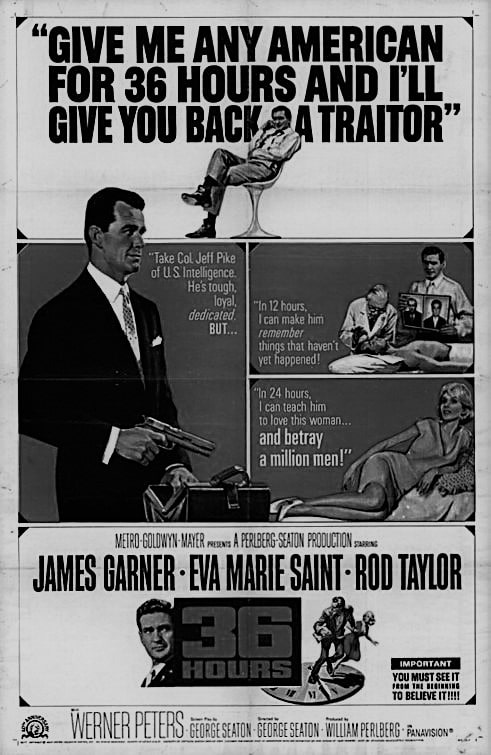 36 HOURS (1964)
36 HOURS (1964) (115 Min.) Genre: 1960 DRAMA, Transfer Quality: A
In 1950, Maj. Jefferson Pike (James Garner), an Army intelligence agent who served with distinction in World War II, awakens in a hospital with severe amnesia. He isn't sure where he is, how he got there, or even who the woman at his side is, even though the doctor tells him that her name is Anna (Eva Marie Saint) and that she is his wife. The doctor instructs Pike to recall, in as much detail as possible, what he was doing before the accident that caused his traumatic memory loss. But the doctor isn't a doctor, Anna isn't Pike's wife, it isn't 1950, and he isn't in an American hospital. World War II is still very much in progress, and Pike is being duped in an elaborate scheme prepared by Maj. Walter Gerber (Rod Taylor), a German intelligence agent. Gerber is trying to trick a drugged and suggestible Pike into telling him everything he knows, as the injured soldier lies in a Bavarian military hospital after being taken prisoner. Will Pike be able to see through the cracks in Gerber's facade before he spills the beans that could mean death and defeat for American soldiers? 36 Hours was later remade for TV under the title Breaking Point. TV fans will want to keep an eye peeled for bit parts by James Doohan from Star Trek and John Banner from Hogan's Heroes.
Starring: James Garner, Eva Marie Saint, Rod Taylor, Werner Peters, John Banner | Directed by: George Seaton
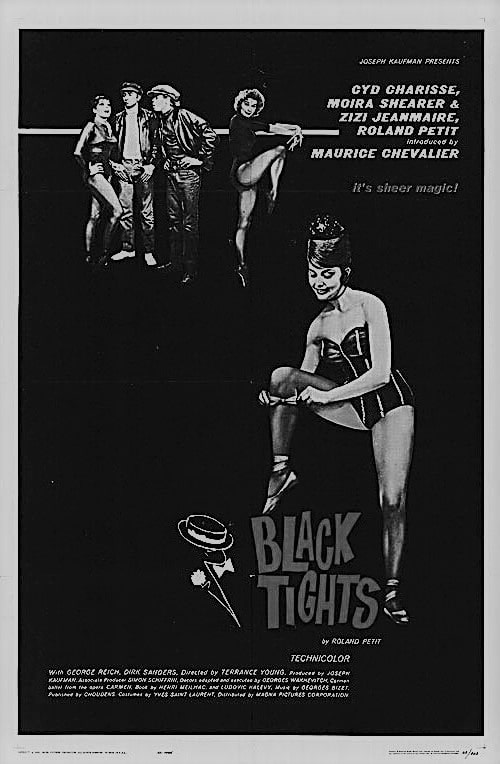 BLACK TIGHTS (1960)
BLACK TIGHTS (1960) (126 Min.) Genre: 1960 DRAMA, Transfer Quality: B
Black Tights is a filmed ballet anthology divided into four all-dance episodes. "The Diamond Cruncher" spotlights Ziza Jeanmaire as a lady mobster who gives up her life of crime for the love of a good man. "Cyrano de Bergerac" stars Roland Petit (who also choreographed) as Cyrano and Moira Shearer as Roxanne; its music was composed by Marius Constant, of Twilight Zone fame. "A Merry Mourning" finds Cyd Charisse flittering her way into a deadly romantic triangle. And "Carmen," starring Jeanmaire once more, is the old story, danced rather than sung to the music of Bizet. Both the French and English-language versions of Black Tights are narrated by Maurice Chevalier.
Starring: Cyd Charisse, Moira Shearer, Zizi Jeanmaire, Maurice Chevalier | Directed by: Terence Young
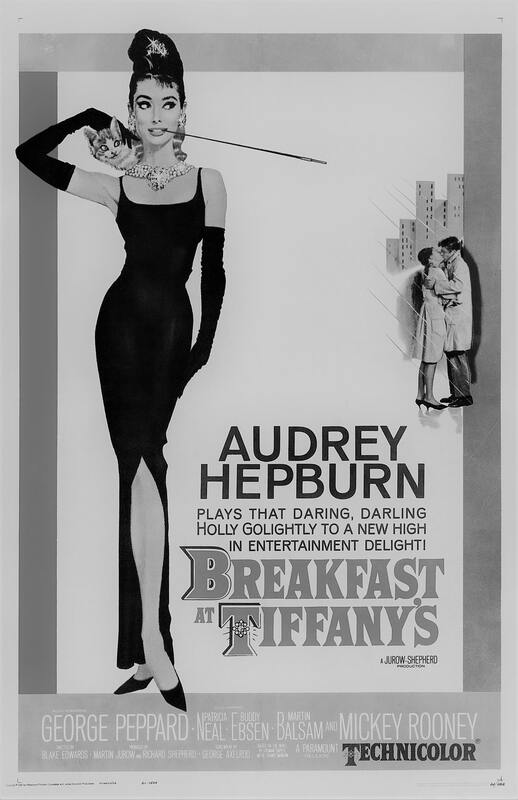 BREAKFAST AT TIFFANY'S (1961)
BREAKFAST AT TIFFANY'S (1961) (114 Min.) Genre: 1960 DRAMA, Transfer Quality: A
In an idealized New York City during the early '60s, Holly Golightly (Audrey Hepburn) is a charming socialite with a youthful zest for life who lives alone in a nearly bare apartment. She has such a flippant lifestyle that she won't even give her cat a name, because that would be too much of a commitment to a relationship. Maintaining a childlike innocence yet wearing the most perfect of designer clothes and accessories from Givenchy, she spends her time on expensive dates and at high-class parties. She escorts various wealthy men, yet fails to return their affections after they have given her gifts and money. Holly's carefree independence is changed when she meets her neighbor, aspiring writer Paul (George Peppard), who is suffering from writer's block while being kept by a wealthy woman (Patricia Neal). Just when Holly and Paul are developing their sweet romance, Doc (Buddy Ebsen) appears on the scene and complicates matters, revealing the truth about Holly's past. Breakfast at Tiffany's was nominated for several Academy awards, winning Best Score for Henry Mancini and Best Song for Johnny Mercer's classic tune "Moon River". — Andrea LeVasseur
Starring: Audrey Hepburn, George Peppard, Patricia Neal, Buddy Ebsen | Directed by: Blake Edwards
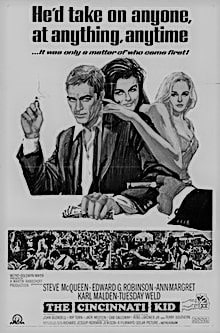 CINCINNATI KID, THE (1965)
CINCINNATI KID, THE (1965) (104 Min.) Genre: 1960 DRAMA, Transfer Quality: A
Steve McQueen stars as the Cincinnati Kid, a crackerjack New Orleans stud poker player. Tired of chicken feed, the Kid decides to challenge The Man (Edward G. Robinson), the reigning poker champ, who is in town for a private game. The Shooter (Karl Malden), another gambling pro, arranges a game between the Kid and the Man, with the Shooter dealing. The game is compromised by the intervention of Slade (Rip Torn), an old foe of the Man's who tries to fix the outcome. The Kid finds out about this and tells Slade to get lost, preferring to win fair and square. The outcome is in the cagey hands of The Man, who is smart enough to do (as one reviewer put it) the wrong thing at the right time. The Cincinnati Kid was based on the novel by Richard Jessup.
Starring: Steve McQueen, Edward G. Robinson, Ann-Margret, Karl Malden, Tuesday Weld, Joan Blondell | Directed by: Norman Jewison
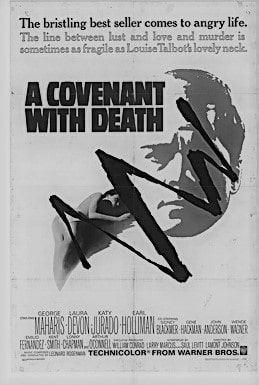 COVENANT WITH DEATH, A (1966)
COVENANT WITH DEATH, A (1966) (97 Min.) Genre: 1960 DRAMA, Transfer Quality: A
In this courtroom drama, a Mexican American judge must preside over the case of the town ne'er-do-well, who is accused of killing his wife. The film is set during the 1920s in the Southwest. The murderer is convicted and sentenced to hang, but on execution day, he has a fight and kills the hangman. At the same time, another man confesses. While this gets the first man freed for the first killing, he must now stand trial for the hangman's death.
Starring: George Maharis, Laura Devon, Katy Jurado, Earl Holliman, Whit Bissell, Gene Hackman | Directed by: Lamont Johnson
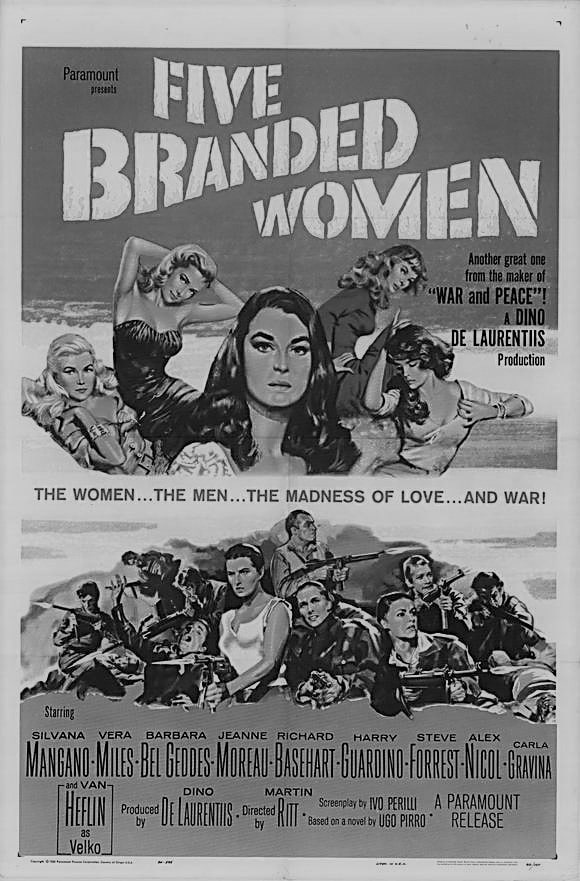 FIVE BRANDED WOMEN (1960)
FIVE BRANDED WOMEN (1960) (101 Min.) Genre: 1960 DRAMA, Transfer Quality: B
Once branded himself by the House Un-American Activities Committee, award-winning director Martin Ritt focuses on the cruel branding of five women in this standard wartime drama. Some of his better-known films (The Spy Who Came In from the Cold, Norma Rae) also deal with the question of social and ethical choices in the face of pressure. In this story, the savagery of the Yugoslav partisans as they fight off Nazi occupation forces is also vented on five women accused of Nazi sympathies because of their sexual association with one German officer. The women (played by Silvana Mangano, Vera Miles, Barbara Bel Geddes, Jeanne Moreau, and Carla Gravina) have their heads shaved in order to brand them as traitors. What the partisans did to the German officer (Steve Forrest) in revenge for sleeping with these women was much worse. Intermittently shocking, the film with its excess cruelty and hatreds stands as a good indictment against war and its causes.
Starring: Silvana Mangano, Vera Miles, Barbara Bel Geddes, Jeanne Moreau, Carla Gravina, Richard Basehart, Harry Guardino, Steve Forrest, Van Heflin | Directed by: Martin Ritt
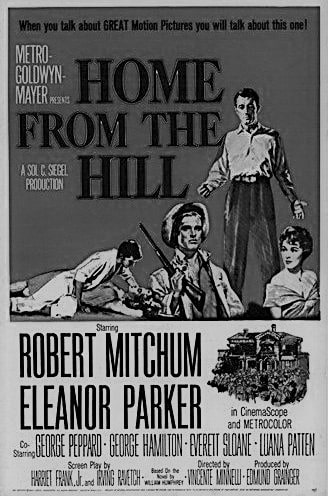 HOME FROM THE HILL (1960)
HOME FROM THE HILL (1960) (150 Min.) Genre: 1960 DRAMA, Transfer Quality: A
William Humphrey's novel Home From the Hill is compressed into 150 minutes for this MGM all-starrer. Robert Mitchum plays Capt. Wade Hunnicutt, a Texas millionaire, married to Hannah (Eleanor Parker). The Hunnicutts have two children of approximately the same age: Wade's biological son, Theron (George Hamilton in one of his earliest film roles), and his illegitimate son, Rafe (George Peppard). As the story opens, Wade conducts an extramarital affair; meanwhile, Theron (George Hamilton), disturbed by his parents' dysfunctional relationship, is not anxious to marry his true love, Libby Halstead (Luana Patten). The vicious cycle threatens to continue when Libby gives birth to Theron's out-of-wedlock son, but it is Rafe who turns Libby into an "honest woman" by acting as father to the child. Vincente Minnelli directs his material operatically, which is as it should be given the larger-than-life character and emotional entanglements he has to deal with.
Starring: Robert Mitchum, Eleanor Parker, George Peppard, George Hamilton, Everett Sloane, Guinn "Big Boy" Williams | Directed by: Vincente Minnelli
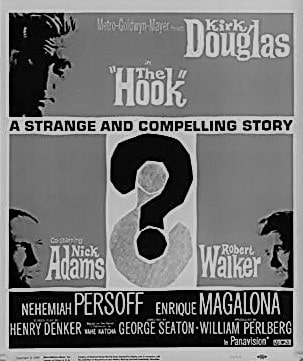 HOOK, THE (1962)
HOOK, THE (1962) (98 Min.) Genre: 1960 DRAMA, Transfer Quality: A
Only slightly murky around the edges of character delineation, this wartime drama by George Seaton focuses on three American soldiers on board a neutral Finnish vessel during the Korean War. Seasoned veteran Sgt. P.J. Briscoe (Kirk Douglas) has had no more than the normal difficulties when being forced to kill the enemy during combat. But now he and Pvts. Dennison (Robert Walker) and Hackett (Nick Adams) have been given orders to execute a prisoner they have on board. Killing outside of active combat is something else, and the men vacillate as they try come to grips with their reluctance. Meanwhile, a few shady aspects of their past come to light.
Starring: Kirk Douglas, Nick Adams, Nehemiah Persoff, Mark Miller, John Bleifer | Directed by: George Seaton
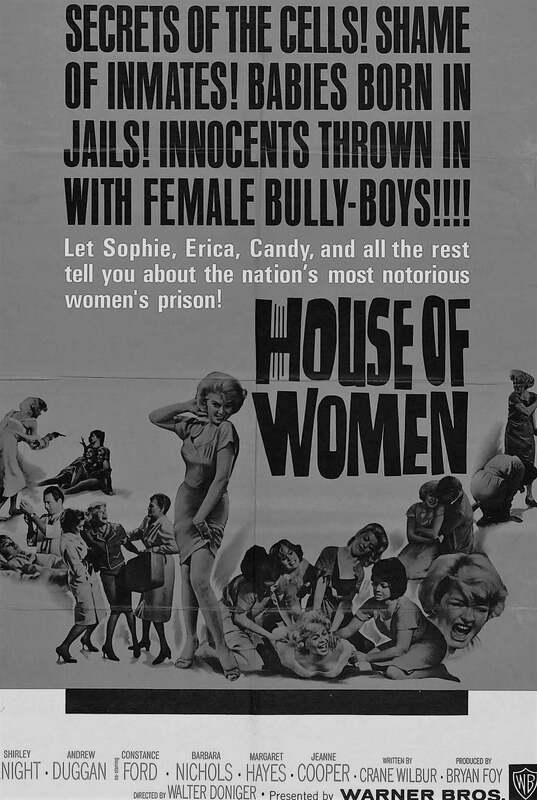 HOUSE OF WOMEN (1962)
HOUSE OF WOMEN (1962) (85 Min.) Genre: 1960 DRAMA, Transfer Quality: A
In this prison drama, a remake of Caged, House of Women (1950), a pregnant woman is wrongly convicted of armed robbery. She is sentenced to five years in prison. After her child is born, the inmate is allowed to keep it. She then has three years to earn parole. If she does not, the babe will be put up for adoption. When the prison warden finds himself attracted to the woman, he makes her his personal maid. Time passes and he falls in love with her resulting in better treatment for the other prisoners. Three years pass and the woman's parole seems assured until the sadistic warden, not wanting to lose the woman he loves, decrees that she will not be paroled and that all imprisoned mothers will lose custody of their children. This harsh action spawns a bloody revolt amongst the inmates. It is the brave woman that quells the uprising. Later media coverage of the event results in her release. The warden is fired.
Starring: Andrew Duggan, Constance Ford, Barbara Nichols, Jeanne Cooper, Virginia Gregg, Patricia Huston | Directed by: Walter Doniger / Crane Wilbur
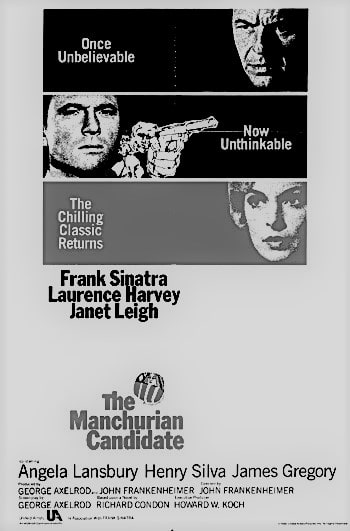 MANCHURIAN CANDIDATE, THE (1962)
MANCHURIAN CANDIDATE, THE (1962) (126 Min.) Genre: 1960 DRAMA, Transfer Quality: A
A brilliant Cold War satire, The Manchurian Candidate is a chilling commentary on political power, international conspiracy, and the gullibility of the American people. A paean to paranoia, it was ahead of its time yet reflected the tensions of its era, and modern-day viewers can use it as a guide to the political and moral climate of the early years of Cold War America. One doesn't have to look hard to find a thinly veiled Senator Joseph McCarthy in zealous anti-Communist Senator Iselin or fears of female dominance in Angela Lansbury's megalomaniacal Mrs. Iselin. In addition to its status as one of the great political satires, The Manchurian Candidate remains a classic for its sharp, often hilarious script, for John Frankenheimer's fine-tuned direction, and for its uniformly excellent performances. Though Laurence Harvey, Frank Sinatra, and Janet Leigh are all thoroughly effective, and James Gregory is pricelessly stupid as Senator Iselin, the film belongs to Lansbury. Her Mrs. Iselin remains one of the screen's most terrifying maternal presences, a queen bee intent on clearing the hive of anyone who stands in her way. Like her clueless husband, the audience can only react dumbly to her, marveling at her single-minded rampage towards world domination. Unavailable for years due to a dispute between Sinatra and United Artists, The Manchurian Candidate is a film that should not be missed. Equal parts satire, political thriller, sly commentary, and history lesson, it has become a terrifying postcard from a time that should not be forgotten. — Rebecca Flint
Starring: Frank Sinatra, Laurence Harvey, Janet Leigh, Angela Lansbury | Directed by: John Frankenheimer
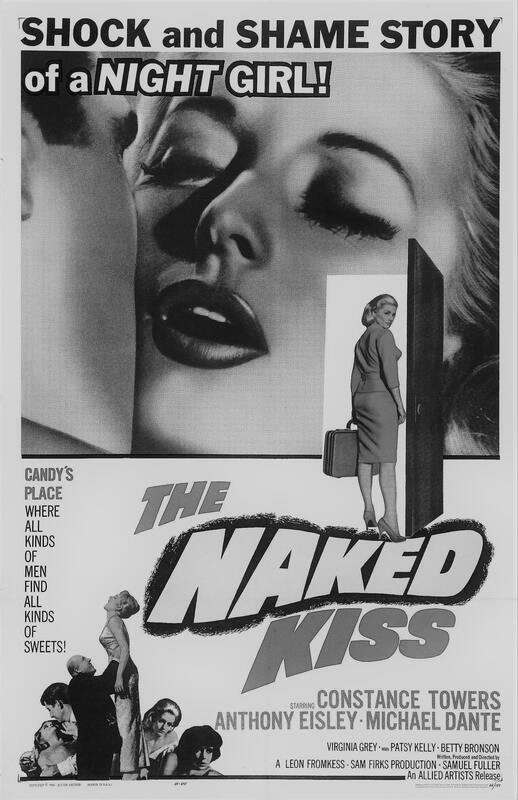 NAKED KISS, THE (1964)
NAKED KISS, THE (1964) (92 Min.) Genre: 1960 DRAMA, Transfer Quality: B
Kelly (Constance Towers), a prostitute who wants to transform her life, beats up her pimp, takes the 75 dollars he owes her, and leaves town. Winding up in the small town of Grantville, she turns a trick with Griff (Anthony Eisley), who is actually the sheriff. After paying her for sex, Griff tells Kelly that Grantville is a clean town and orders her out, though he refers her to a brothel in a neighboring city. Instead, Kelly makes a final break with her past and becomes a nurse's aide at the local children's hospital. In that capacity, she meets Grant (Michael Dante), who is a benefactor of the hospital, a descendant of the town's founder -- and Griff's best friend. As Grant and Kelly fall in love, Griff viciously accuses Kelly of using her hospital job to hide ongoing illicit activities. When Kelly tells Grant about her past, he seems to accept her without reservation and proposes marriage; however, Kelly soon learns the perverse truth about her fiancée and takes matters into her own hands. Samuel Fuller's raw film noir exposes the hypocrisy of a supposedly proper society. Beneath the veneer of respectability lies an exploitive abuse of power, no different from that of any pimp.
Starring: Constance Towers, Anthony Eisley, Michael Dante, Virginia Grey, Betty Bronson | Directed by: Samuel Fuller
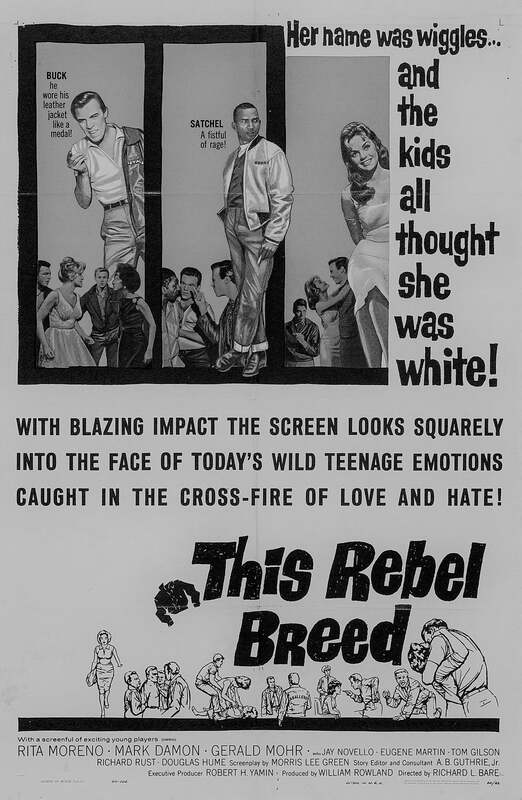 REBEL BREED, THE (1960)
REBEL BREED, THE (1960) (90 Min.) Genre: 1960 DRAMA, Transfer Quality: B
Race hatred and drug trafficking threaten to tear apart a California high school in this teen drama. Frank White (Mark Damon) and Don Walters (Doug Hume) are a pair of undercover police officers who are sent to a high school dominated by three gangs. Don, who is white, tries to infiltrate the Anglo gang the Royals, led by Buck (Richard Rust), while Frank, who is of Hispanic and African-American heritage, is to make his way into the school's black gang, the Ebonys, while also keeping his eye on a Mexican-American club, the Caballeros. Frank soon finds he's not welcomed by the Black or Mexican gangs, and when he strikes up a friendship with Lola (Rita Moreno), a pretty Mexican-American girl, he gains a fierce enemy in her brother Manuel (Richard Laurier), one of the leaders of the Caballeros. Meanwhile, Buck and the Royals have started dealing dope as a way to make money, and he's pressuring Manuel and his gang to do the same, something Manuel fiercely opposes. Manuel is also not happy about rumors that Lola is secretly dating one of the Royals, while the Ebonys have it in for Buck when they find out the secret hidden by his sexy girlfriend, Wiggles (Dyan Cannon, then still spelling her first name "Diane"). This Rebel Breed was first released in 1960; five years later, producer William Rowland added some incongruous inserts filled with nudity and re-released the film to grindhouses and drive-ins under the titles Black Rebels, Lola's Mistake, and Three Shades of Love.
Starring: Rita Moreno, Mark Damon, Gerald Mohr, Dyan Cannon, Jay Novello | Directed by: Richard L. Bare
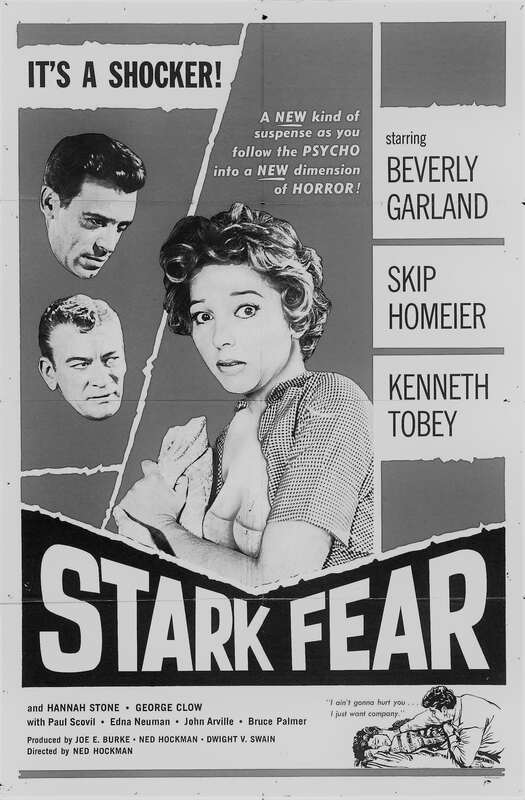 STARK FEAR (1963)
STARK FEAR (1963) (86 Min.) Genre: 1960 DRAMA, Transfer Quality: B
A marriage falls apart after a dutiful wife becomes the breadwinner after her husband loses his job. This angers him and after reveling in her humiliation, he leaves her. Fortunately, the wife lands on her feet, but not before she obtains closure with her brutish husband.
Starring: Beverly Garland, Skip Homeier, Kenneth Tobey, Hannah Stone, George Clow | Directed by: Ned Hockman
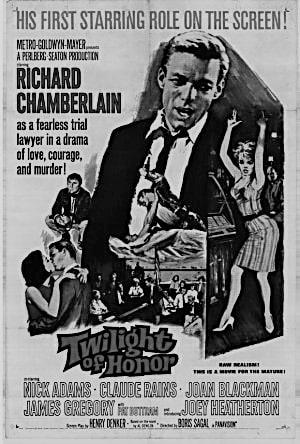 TWILIGHT OF HONOR (1963)
TWILIGHT OF HONOR (1963) (115 Min.) Genre: 1960 DRAMA, Transfer Quality: A
Former TV leading man Richard Chamberlain plays a young lawyer about to take on an important murder case. He is shepherded through this big break by veteran attorney Claude Rains. The client is the disreputable Nick Adams, who seems determined to sabotage his own case. But a last-minute scrap of evidence saves the day and establishes Chamberlain's reputation. Based on a novel by Al Dewlen, Twilight of Honor was released in Britain as The Charge is Murder.
Starring: Richard Chamberlain, Joey Heatherton, Nick Adams, Claude Rains, James Gregory | Directed by: Boris Sagal
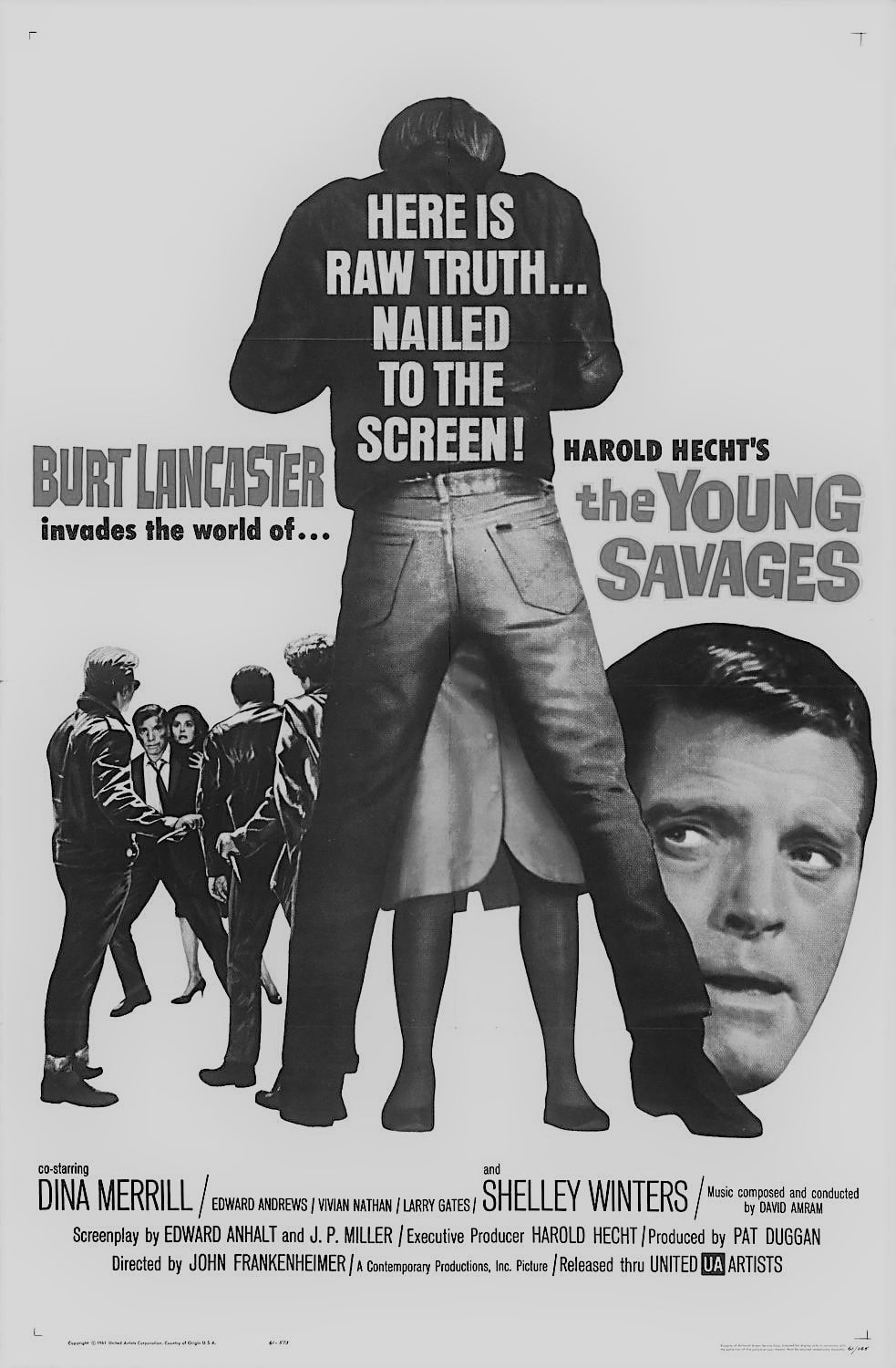 YOUNG SAVAGES, THE (1961)
YOUNG SAVAGES, THE (1961) (103 Min.) Genre: 1960 DRAMA, Transfer Quality: B
The Young Savages is what used to be called a "thinking man's picture" about a potentially lurid subject: urban juvenile delinquency. A blind Puerto Rican boy is knifed to death in Spanish Harlem, and three teenage gang members are accused of the crime. Politically ambitious assistant DA Burt Lancaster initially presses for the conviction of all three boys. But as he gets deeper into the case, he realizes that what appears cut-and-dried on the surface is tortuously complex: for starters, the murder victim was hardly the paragon of virtue that the prosecution claims. Despite pressure from his superiors and from members of the accused boys' gang (who at one point threaten Lancaster's wife Dina Merrill with a switchblade,) Lancaster nonetheless sees to it that justice is properly administered. The defendants are portrayed with varying degrees of Brando/Dean "method" by John Davis Chandler, Neil Nephew and Stanley Kristien; more believable, less affected performances are rendered by Shelley Winters, Pilar Seurat and Telly Savalas. Filmed on location in New York, The Young Savages was based on the Evan Hunter novel A Matter of Conviction.
Starring: Burt Lancaster, Dina Merrill, Shelley Winters, Edward Andrews, Telly Savalas | Directed by: John Frankenheimer

